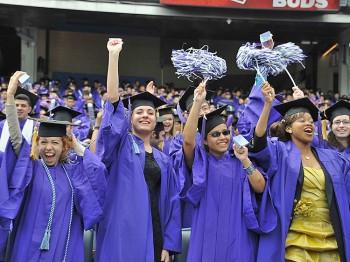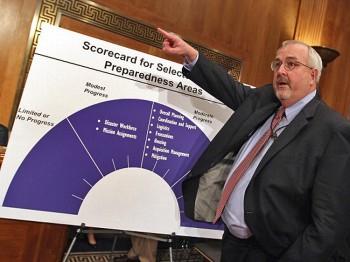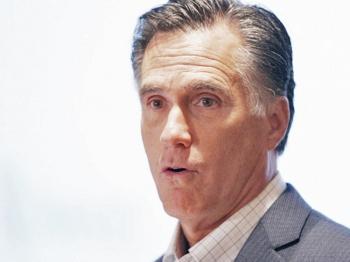BOSTON—It began as a fight against obesity among children and youth, with a 2004 ban on junk food and soda in vending machines in Boston public schools. Mayor Thomas Menino issued an executive order last week to remove sugary beverages from vending machines on all city property. Over the next six months, advertising, sales, and promotion of such beverages will be phased out. He outlined steps for the city to take.
Menino stated in a press release that he wants to “set an example for the city as a whole. … I want to create a civic environment that makes the healthier choice the easier choice in people’s lives, whether it’s schools, worksites, or other places in the community.” He cited the link between drinking high-calorie sweet beverages and rising obesity rates and health care costs.
The city will color-code drinks as red, yellow, or green. The red ones, soon to be banished, are juice and sports drinks with added sugar, cold sweetened coffees and teas, and nondiet sodas and energy drinks. They will be replaced with yellow and green choices. Yellow means 100 percent juice drinks, low-calorie sports drinks, sweetened milk and soy milk, and other low-sugar sweet drinks. Green means bottled water, flavored and unflavored seltzer water, low-fat milk, and unsweetened soy milk. Both yellow and green drinks will be available on city property.
“Many people are unaware that a single, 20-ounce regular soda contains 17 teaspoons of sugar,” said Dr. Nancy Norman, chief medical officer at the Boston Public Health Commission, in a statement marking last summer’s Boston campaign encouraging people to give up soda for the season.
An average American consumes more than one-half cup of sugar a day. Sugar-sweetened beverages account for approximately 10 percent of the total calories consumed in the average American diet.
The mayor’s announcement quoted the Boston Public Health Commission, which said that about 63 percent of black adults, 51 percent of Latino adults, and 49 percent of white adult residents in Boston are overweight or obese. According to the commission almost 30 percent of preventable diseases, such as Type 2 diabetes, and certain cancers, arthritis, heart attacks, and strokes, are linked to obesity in adults.
Initial reactions to the mayor’s order have been mixed. Those who do not like to be told what to drink are calling Boston a nanny state. Some vendors fear the impact on their businesses, and then there are the health and medical professionals who gave it an accolade.
Other cities that have set limits on unhealthy foods and drinks on municipal property are San Francisco, San Antonio, Los Angeles, and New York City.
“There is abundant evidence that the huge increase in soda consumption in the past 40 years is the most important single factor behind America’s obesity epidemic,” said Dr. Willett of the Harvard School of Public Health in a statement from the mayor’s office. “These steps will greatly assist in creating a new social norm, in which healthier beverages are the preferred choice.”
Menino stated in a press release that he wants to “set an example for the city as a whole. … I want to create a civic environment that makes the healthier choice the easier choice in people’s lives, whether it’s schools, worksites, or other places in the community.” He cited the link between drinking high-calorie sweet beverages and rising obesity rates and health care costs.
The city will color-code drinks as red, yellow, or green. The red ones, soon to be banished, are juice and sports drinks with added sugar, cold sweetened coffees and teas, and nondiet sodas and energy drinks. They will be replaced with yellow and green choices. Yellow means 100 percent juice drinks, low-calorie sports drinks, sweetened milk and soy milk, and other low-sugar sweet drinks. Green means bottled water, flavored and unflavored seltzer water, low-fat milk, and unsweetened soy milk. Both yellow and green drinks will be available on city property.
“Many people are unaware that a single, 20-ounce regular soda contains 17 teaspoons of sugar,” said Dr. Nancy Norman, chief medical officer at the Boston Public Health Commission, in a statement marking last summer’s Boston campaign encouraging people to give up soda for the season.
An average American consumes more than one-half cup of sugar a day. Sugar-sweetened beverages account for approximately 10 percent of the total calories consumed in the average American diet.
The mayor’s announcement quoted the Boston Public Health Commission, which said that about 63 percent of black adults, 51 percent of Latino adults, and 49 percent of white adult residents in Boston are overweight or obese. According to the commission almost 30 percent of preventable diseases, such as Type 2 diabetes, and certain cancers, arthritis, heart attacks, and strokes, are linked to obesity in adults.
Initial reactions to the mayor’s order have been mixed. Those who do not like to be told what to drink are calling Boston a nanny state. Some vendors fear the impact on their businesses, and then there are the health and medical professionals who gave it an accolade.
Other cities that have set limits on unhealthy foods and drinks on municipal property are San Francisco, San Antonio, Los Angeles, and New York City.
“There is abundant evidence that the huge increase in soda consumption in the past 40 years is the most important single factor behind America’s obesity epidemic,” said Dr. Willett of the Harvard School of Public Health in a statement from the mayor’s office. “These steps will greatly assist in creating a new social norm, in which healthier beverages are the preferred choice.”


